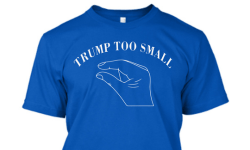Dear Doc:
In the United States, you can register just about any trademark on just about anything. Marks that are not okay in foreign countries (like place names such as “champagne”) are routinely used and registered in the USofA. Why, then, did the Supreme Court nix registration of the mark “Trump Too Small”?
Signed,
Rube Marko
Dear Rube:
After a certain Senator from Florida remarked in a 2016 debate that we should not trust a candidate with “small hands,” a fellow named Steve Elster tried to register the phrase “Trump Too Small” for use on T-shirts that mocked the candidate who assured us that everything was fine in his, uh, pants. The United States Patent and Trademark Office refused because it has a rule against registration of any mark that identifies “a particular living individual” without their consent. Elster said that this violated his First Amendment free speech rights, and now, the Supreme Court has told us what they think.
In Vidal v. Elster, the 9 Justices wrestled with the rule that a mark identifying a living person could only be registered if the consent of that person was obtained. (Never mind that there may be many living persons named “Trump,” and that the word is a common English word…) The issue before the Court was a complex one about whether the restriction is “content-based” (meaning that the mark sought to be registered is being rejected based on what it says) or “viewpoint-based” (meaning that some marks are allowed while others are not, based on the meaning). The Court concluded that because the Trademark Office had in the past rejected “Welcome President Biden,” “I Stump for Trump,” and “Obama Pajama,” the rejection was viewpoint-neutral but content-based.
The Court ruled 9-0 against Elster to uphold the rejection even though the Justices differed in their reasoning. Justice Barrett (joined in part by Sotomayor, Kagan, and Jackson), wrote separately that the majority, led by Thomas, was “wrong twice over” in how the case was analyzed. Thomas, they said, was wrong to rely only on history to justify the ruling, and in any event, got his history dead wrong. Justices Kavanaugh and Roberts wrote separately that there could be other instances where viewpoint-neutral, content-based restrictions might be constitutional even absent a historical basis.
In the end, the registration was refused, but in the US, registration is NOT required to market goods or services under an unregistered trademark. Elster still gets to sell his shirts, and, the Doc supposes, warns us not to trust people who have “small hands”.
Do you have a trademark in need of registration? Other questions about intellectual property law? Call the attorneys at LW&H. They’re good at this stuff.
Until next month,
The “Doc”
— Lawrence A. Husick, Esq.



